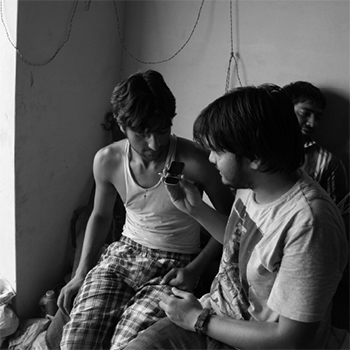Authentication techniques for mobile applications in developing regions have largely been adopted from those used in developed countries. While there has been significant research done to determine how human behaviour affects authentication techniques in the developed world, much less attention has been paid to devising novel authentication techniques for users in developing regions. In this project, we consider authentication mechanisms that rely on shared information possessed by members of a social network. We describe a proof-of-concept field study to investigate how ties within the close-knit social structures in developing regions can be leveraged to provide an authentication mechanism for mobile phone users. This was a two-stage field study involving 174 subjects conducted over a period of five months. The basis for using social authentication, in which users are queried about events and other private information by friends and family members they have nominated, was derived through studies involving 54 participants. This was followed by a field study of a mid-fidelity prototype involving 120 participants. Our results indicated that users find social authentication simple and usable, and that more familiarity with this technology will significantly improve its efficacy.



